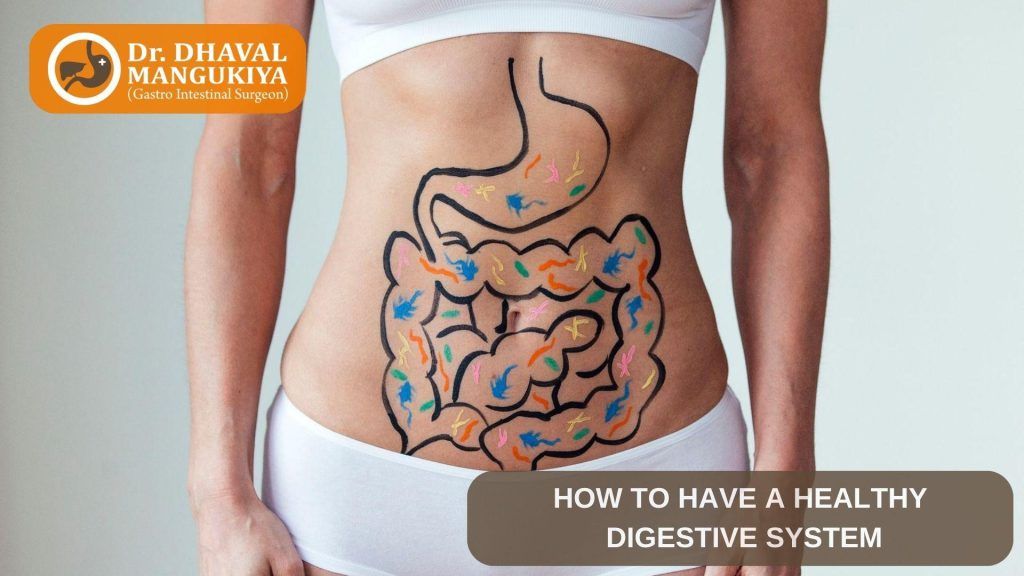A healthy digestive system is the cornerstone of overall well-being. It ensures that your body absorbs essential nutrients and eliminates waste efficiently. To shed light on this vital aspect of health, Dr. Dhaval Mangukiya, one of the best gastrointestinal surgeons in Surat, shares valuable insights and practical tips on how to maintain and promote a healthy digestive system.
Understanding the Digestive System
Before we delve into tips for digestive health, it’s essential to understand how the digestive system works. Dr. Mangukiya explains, “The digestive system is a complex network of organs, including the mouth, esophagus, stomach, small intestine, large intestine, liver, gallbladder, and pancreas. Its primary function is to break down food, absorb nutrients, and eliminate waste.”
Key Components of a Healthy Digestive System
1. Balanced Diet
Dr. Mangukiya emphasizes the importance of a balanced diet rich in fiber, vitamins, and minerals. “A diet that includes fruits, vegetables, whole grains, lean proteins, and healthy fats is essential for optimal digestive health,” he advises. Fiber, in particular, aids in regular bowel movements and prevents constipation.
2. Adequate Hydration
Proper hydration is critical for digestion. Water helps break down food and transport nutrients throughout the body. Dr. Mangukiya recommends drinking plenty of water throughout the day to keep your digestive system running smoothly.
3. Regular Exercise
Physical activity plays a significant role in digestive health. “Exercise promotes bowel regularity and helps prevent conditions like constipation,” Dr. Mangukiya, one of the best gastro surgeons in Surat explains. Engaging in regular workouts also helps maintain a healthy weight, reducing the risk of obesity-related digestive issues.
4. Avoid Overeating
The best stomach surgeons in Surat agree that overindulging can overwhelm the digestive system, leading to discomfort and indigestion. Dr. Mangukiya advises, “Eat in moderation, and listen to your body’s hunger and fullness cues.” Smaller, more frequent meals may be easier for some individuals to digest.
5. Mindful Eating
Eating mindfully means savouring your meals, chewing slowly, and paying attention to your body’s signals. Dr. Mangukiya adds, “Avoid eating in front of screens or while multitasking. Focus on your food, and your body will thank you.”
Common Digestive Disorders and Prevention
Being one of the best laparoscopic surgeons in Surat, Dr. Mangukiya sheds light on some prevalent digestive disorders and how to prevent them:
1. Gastroesophageal Reflux Disease (GERD)
GERD occurs when stomach acid flows back into the oesophagus, causing heartburn and irritation. To prevent GERD, Dr. Mangukiya advises avoiding trigger foods like spicy and acidic items, maintaining a healthy weight, and eating smaller meals.
2. Irritable Bowel Syndrome (IBS)
IBS can cause abdominal pain, bloating, and changes in bowel habits. Some of the best gastro surgeons in Surat, including Dr. Mangukiya, suggest managing stress through relaxation techniques, maintaining a food diary to identify trigger foods, and consuming soluble fiber.
3. Constipation
Chronic constipation can lead to discomfort and other complications. It is recommended to increase fibre intake, staying hydrated, and being physically active to prevent and alleviate constipation.
4.Inflammatory Bowel Disease (IBD)
Inflammatory Bowel Disease encompasses conditions like Crohn’s disease and Ulcerative Colitis. Dr. Mangukiya emphasizes the importance of early diagnosis and personalized treatment plans. “Lifestyle modifications, medications, and, in some cases, surgery from the best laparoscopic surgeon in Surat can effectively manage IBD,” he says.
5. Gallstones
Gallstones can cause intense abdominal pain. Dr. Mangukiya suggests maintaining a healthy weight, avoiding rapid weight loss, and following a balanced diet low in saturated fats to reduce the risk of gallstones.
6. Liver Disease
Liver health is crucial for digestion and overall well-being. Dr. Mangukiya encourages limiting alcohol consumption, getting vaccinated against hepatitis, and avoiding excessive use of over-the-counter pain medications that can harm the liver.
When to Seek Medical Attention
🡺 If you experience persistent symptoms such as abdominal pain, changes in bowel habits, or unexplained weight loss, it’s essential to seek medical evaluation.
🡺 If you have a family history of digestive disorders, you may be at higher risk. Regular check-ups and screenings can help detect issues early.
🡺 Certain screenings, such as colonoscopies for colorectal cancer prevention, are recommended based on age and risk factors.
🡺 If you’re taking medications known to affect the digestive system, discuss potential side effects with your healthcare provider.
🡺 Any unusual or concerning symptoms related to digestion should prompt a visit to a gastroenterologist for a thorough assessment.
Conclusion
Maintaining a healthy digestive system is integral to your overall well-being. By following these steps you can take proactive steps to promote digestive health. Remember that individual needs may vary, so consult with a healthcare professional for personalized recommendations and treatment options. With the right approach to diet, lifestyle, and medical care, you can enjoy the benefits of a healthy digestive system and lead a fulfilling life.

